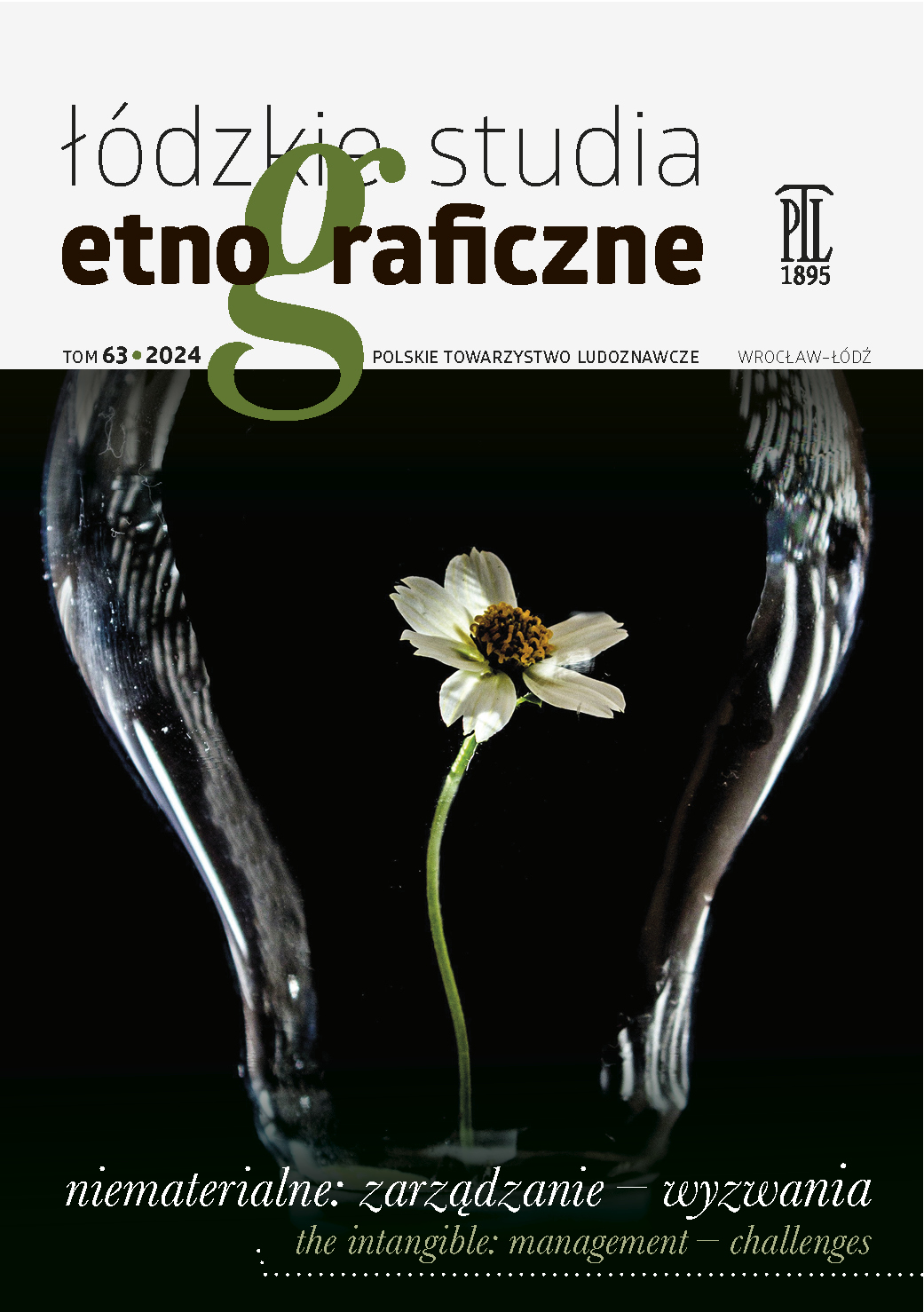Challenges and opportunities in preserving intangible cultural heritage: lessons from the Demoscene
DOI:
https://doi.org/10.12775/LSE.2024.63.12Klíčová slova
Demoscene, digital culture, digital art, preservation, computer interactionAbstrakt
The Demoscene is a pioneering digital culture and an art form. Its roots in Poland date back to the mid-1980s. In 2019, the Polish Demosceners, alongside their Finnish and German counterparts in the Art of Coding campaign, embarked on an initiative to advocate for the recognition of the Demoscene by UNESCO. This move highlighted the tension between the inherently decentralised and demarcating nature of the Demoscene and formal requirements of cultural heritage preservation. In this paper, we present a brief overview of the Demoscene, combining personal observations from the UNESCO enlisting process with insights gathered from a supportive study conducted among Demoscene community members. The results of this study are presented in the context of digital preservation challenges in various domains, offering a comparative perspective. The paper concludes with some insights into what information to store alongside the Demoscene productions themselves and outlines potential further work, addressing both current and emerging challenges faced by the Demoscene community.
Reference
Barwick, J., Dearnley, J., Muir, A. (2011). Playing games with cultural heritage: A comparative case study analysis of the current status of digital game preservation. Games and Culture, 6(4), 373–390. DOI: https://doi.org/10.1177/1555412010391092.
Besser, H. (1999) Digital longevity. Acquired from: https://besser.tsoa.nyu.edu/howard/Papers/sfs-longevity.html.
Breddin, M. (2017). Breaking’ The Borders. A true story of digital liberation and Power Without The Price. Hannover: Microzeit.
Breddin, M. (2021). Crackers. Episode One. The Gold Rush, Hannover: Microzeit.
Clinton, K., Purushotma, R., Robinson, A., Weigel, M. (2006). Confronting the Challenges of Participatory Culture: Media Education for the 21st Century. Chicago: MacArthur.
Cloonan, M.V. (2001). W(h)ither Preservation? The Library Quarterly, 71(2), 231–242. Acquired from: https://besser.tsoa.nyu.edu/howard/Papers/sfs-longevity.html.
Czerski, P. (2014). Maszyny, które mogą wszystko. Ha!art: studencki magazyn kulturalno-artystyczny, 47(3), 10–24.
Goode, S., Cruise, S. (2006). What motivates software crackers? Journal of Business Ethics, 65, 173–201. DOI: https://doi.org/10.1007/s10551-005-4709-9.
Grzeszczuk, M., Skorupska, K. (2023). Preserving the Artifacts of the Early Digital Era: A Study of What, Why and How? In: 11th Machine Intelligence and Digital Interaction MIDI Conference proceedings. DOI: https://doi.org/10.48550/arXiv.2312.06570.
Grzeszczuk et. al. (2023). Preserving Tangible and Intangible Cultural Heritage: the Cases of Volterra and Atari In: 11th Machine Intelligence and Digital Interaction MIDI Conference proceedings. DOI: https://doi.org/10.48550/arXiv.2403.02908.
Guttenbrunner, M., Becker, C., Rauber, A. (2010). Keeping the game alive: Evaluating strategies for the preservation of console video games. International Journal of Digital Curation, 5(1), 64–90. DOI: https://doi.org/10.2218/ijdc.v5i1.144.
Harkai, I. (2022). Preservation of video games and their role as cultural heritage. Journal of Intellectual Property Law and Practice, 17(10), 844–856. DOI: https://doi.org/10.1093/jiplp/jpac090.
Heinonen, M., Reunanen, M. (2009). Preserving Our Digital Heritage: Experiences from the Pelikonepeijoonit Project. In: J. Impagliazzo, T. Järvi, P. Paju (eds.), History of Nordic Computing 2 (pp. 55–64). Heidelberg, Berlin: Springer. DOI: http://doi.org/10.1007/978-3-642-03757-3_6.
Helsen, A.L. (2021). Demoparties in Northwestern Europe, 1991–2020 [Doctoral dissertation, Staatliche Hochschule für Gestaltung Karlsruhe]. Acquired from: https://www.researchgate.net/publication/356109247_Demoparties_in_Northwestern_Europe_1991-2020.
Lorie, R.A. (2001). A project on preservation of digital data. DigiNews, 5(3). Acquired from: https://web.archive.org/web/20060608030054/http://www.rlg.org/preserv/diginews/diginews5-3.html.
Manovich, L. (2002). The language of new media. Cambridge: MIT Press.
Marecki, P. (2016). The Trope Tank. The idea of a lab in humanities. Nick Montfort* in conversation with Piotr Marecki. Zarządzanie w kulturze, 17(2), 185–193. Acquired from: http://www.ejournals.eu/Zarzadzanie-w-Kulturze/Tom-17-2016/17-2-2016/art/7056/.
Marecki, P. (2019), Praktyka i eksperyment: laboratoryjny model humanistyki. Kraków: Wydawnictwo Uniwersytetu Jagiellońskiego.
McDonough, J., Olendorf, R., Kirschenbaum, M., Kraus, K.M., Reside, D., Donahue, R., Phelps, A.M., Egert, C., Lowood, H. Rojo, S. (2010). Preserving virtual worlds final report. Urbana-Champaign: University of Illinois.
Morrissey, S.M. (2020). Preserving Software: Motivations, Challenges and Approaches. In: DPC Technology Watch Guidance Note. Digital Preservation Coalition. DOI: http://doi.org/10.7207/twgn20-02.
Sawicka, M. (2014). Demoscena: sztuka prosto z komputera? Ha!art: studencki magazyn kulturalno-artystyczny, 47(3).
Schechner, R. (2017). Performance studies: An introduction. New York: Routledge.
Shor, S., Eyal, A. (2004). DEMOing: An Emerging Artform or Just Another Digital Craft? Intelligent Agent, 4(1).
Swalwell, M., de Vries, D. (2013). Collecting and Conserving Code: Challenges and Strategies. Scan: Journal of Media Arts Culture, 10(2). Acquired from: http://scan.net.au/scn/journal/vol10number2/Melanie-Swalwell.html.
Swalwell, M. (2013). Moving on from the Original Experience: Games history, preservation and presentation. In: Proceedings of DiGRA 2013 Conference: DeFragging Game Studies. Acquired from: https://www.academia.edu/4184809/Moving_on_from_the_Original_Experience_Gam%20es_history_preservation_and_presentation.
Takhteyev, Y., Dupont, Q. (2013). Retrocomputing as preservation and remix. Library Hi Tech., 31, 355–370. DOI: https://doi.org/10.1108/07378831311329103.
Walker, S.M. (2021). Versioning Buddhism: Remix and Recyclability in the Study of Religion. In: Navas E., Gallagher O., burrough x. (eds.), The Routledge Handbook of Remix Studies and Digital Humanities (95–108). New York: Routledge. DOI: https://doi.org/10.4324/9780429355875-6.
Wasiak, P. (2021). ‘Illegal Guys’. A History of Digital Subcultures in Europe during the 1980s. Zeithistorische Forschungen–Studies in Contemporary History, 9(2), 257–276.
Waters, D., Garrett, J. (1996). Preserving Digital Information. Report of the Task Force on Archiving of Digital Information. Washington, DC: The Commission on Preservation and Access.
Winget, M. (2011). Videogame Preservation and Massively Multiplayer Online Role-Playing Games: A Review of the Literature. Journal of the American Society for Information. Science and Technology, 62. 1869–1883. DOI: https://doi.org/10.1002/asi.21530.
Wojtowicz, T., Taylor, J., Fouquar, F., Kirkby, L., Mattila, A.L., Argasiński, J.K. (2021). Ł. Szałankiewicz, A. Lichnerowicz (eds.), Workshop: Limitations Driven Creativity Through Demoscene Lenses. SIGGRAPH.
Online sources
Stahování
Publikováno
Jak citovat
Číslo
Sekce
Licence
Copyright (c) 2024 Lodz Ethnographic Studies

Tato práce je licencována pod Mezinárodní licencí Creative Commons Attribution-NoDerivatives 4.0.
1. Autorzy udzielają wydawcy (Polskiemu Towarzystwu Ludoznawczemu) licencji niewyłącznej na korzystanie z utworu w następujących polach eksploatacji:
a) utrwalanie Utworu/przedmiotu prawa pokrewnego;
b) reprodukowanie (zwielokrotnienie) Utworu/przedmiotu prawa pokrewnego drukiem i techniką cyfrową (ebook, audiobook);
c) wprowadzania do obrotu egzemplarzy zwielokrotnionego Utworu/przedmiotu prawa pokrewnego;
d) wprowadzenie Utworu/przedmiotu prawa pokrewnego do pamięci komputera;
e) rozpowszechnianie utworu w wersji elektronicznej w formule open access na licencji Creative Commons (CC BY - ND 4.0).
2. Autorzy udzielają wydawcy licencji nieodpłatnie.
3. Korzystanie przez wydawcę z utworu na ww. polach nie jest ograniczone czasowo, ilościowo i terytorialnie.
Stats
Number of views and downloads: 967
Number of citations: 0



